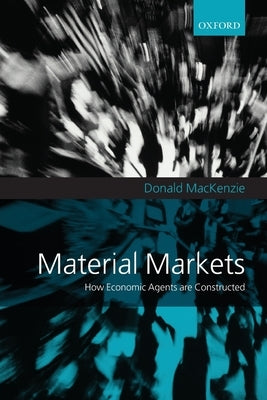1
/
of
1
Oxford University Press, USA
Material Markets: How Economic Agents Are Constructed
Material Markets: How Economic Agents Are Constructed
Regular price
€52,95 EUR
Regular price
Sale price
€52,95 EUR
Shipping calculated at checkout.
Quantity
Couldn't load pickup availability
Financial markets, processes, and instruments are often difficult to fathom; the credit crisis highlights both their importance and their fragility. Donald MacKenzie is one of the most perceptive analysts of the workings of the financial world. In this book, he argues that economic agents and markets need to be analyzed in their full materiality: their physicality, their corporeality, their technicality. Markets are populated not by disembodied, abstract agents, but by embodied human beings and technical systems. Concepts and systematic ways of thinking that simplify market processes and make them mentally tractable are essential to how markets function. In putting forward this material sociology of markets, the book synthesizes and contributes to the field of social studies of finance; the application to financial markets not just of economics but of wider social-science disciplines, in particular science and technology studies. The topics covered include the development of financial derivatives exchanges; arbitrage; how corporate profit figures are constructed; the crucial new markets in carbon emissions; and a case-study of a hedge fund (based, unusually, on direct observation of its trading). The book will appeal to research students and academics across the social sciences, and the general reader will enjoy the book's explanations and analyses of some of the most important phenomena of today's turbulent markets.
Author: Donald MacKenzie
Publisher: Oxford University Press, USA
Published: 03/17/2019
Pages: 240
Binding Type: Paperback
Weight: 0.70lbs
Size: 9.10h x 6.10w x 0.60d
ISBN: 9780198835301
Author: Donald MacKenzie
Publisher: Oxford University Press, USA
Published: 03/17/2019
Pages: 240
Binding Type: Paperback
Weight: 0.70lbs
Size: 9.10h x 6.10w x 0.60d
ISBN: 9780198835301
About the Author
Donald MacKenzie, Professor of Sociology, University of Edinburgh
Share


